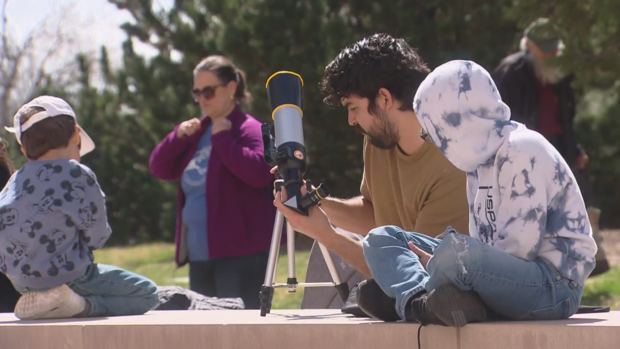Dozens of spotters flocked to the Denver Museum of Nature and Science to witness a rare planetary event: the solar eclipse.
The museum held a solar eclipse viewing party which included activities, telescopes, and sunspotters. They say it’s the perfect time to educate kids about science in a visual way.
“We came to see the solar eclipse!” said 4-year-old Liam Guzman.
Even the youngest already know the eclipse basics.
CBS
“Eclipse is when the moon, it hit to the sun in the muddle!” said Guzman.
“The moon passes by over the sun,” another boy said.
And the No. 1 rule of solar eclipse spotting: “It’s like dangerous to look at the sun,” said 11-year-old Jaden McGahey.
“I wanna make sure I wouldn’t damage my eyes. I’d feel really left out if I didn’t have glasses and be tempted to look at the big old ball of fire,” said adult Lain Britt.
CBS
As the solar eclipse began, dozens of protected eyes turned to the sky.
“We will see the moon!” said Guzman.
While others watched the event through telescopes.
“We got it for him for Christmas. He really likes everything about space so this is a good gift,” said Guzman’s mom, Marlyn.
At 12:40 p.m., the solar eclipse was at its peak in Denver with 65% totality. While not enough to block the sun’s light fully, it left a cool in the air and shadows on the ground.
“Looking at the leaves, the shadow of the leaves and the moon showing up the crescent,” said Britt.
CBS
A crescent image, cementing the memory of their first solar eclipse for the youngest Coloradans.
“I saw the solar eclipse!” said Guzman.
If you missed the solar eclipse, no worries, you just have to hang in there for 20 years. There will be another one in 2044.




